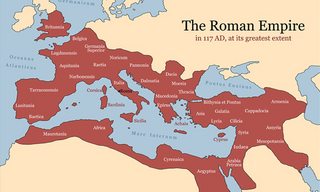Thread replies: 12
Thread images: 2
Thread images: 2
File: 2015-10-09-1444414293-4246321-romanempire.jpg (207KB, 1000x600px) Image search:
[Google]

207KB, 1000x600px
Can someone teach me a little bit about Roman placenames?
Mainly, what determined for the Romans calling something -ia vs. -ium? Obviously the words themselves are two different genders, but why is it Italia and Britannia and not Italium and Britannium? Why Antium and not Antia?
Anything else you can tell me about Roman toponymy?
>>
I'm pretty sure -ia is the plural and -ium is the singular.
>>
Regions/countries seem to predominantly have -ia attached to the end while cities seem to be a mixture of -ia and -ium.
>>
>>1036534
somebody asked pretty much exactly this question in my Latin class a while ago, and I think the professor basically said that there was no rhyme or reason to which ending the name used. I think a lot of the names came from whatever the locals called the place anyways, or in some cases the Romans either used the Greek name or just pulled something out of their asses
>>1036537
you're thinking of the neuter gender, which I don't think was used in any placenames, but I honestly have no clue what the justification for it was.
>>
>>1036534
>-ia
an equivalent to land, ending used for territory
>-ensis
a latin ending meaning "pertaining to." used for provinces centered on a city with no historic name or ethnic group attached.
>-orum
Plural for a people (Gothorum, Romanorum)
>-ica, -icum
belonging to or derived from. There was no illyricum derived its name from the Illyrians but it wasn't know as such before.
>>
>>1037370
so it's kind of like how many American cities randomly end in -ville or -ton
>>
>>1037387
>There was no illyricum
I meant illyria
>>
>>1037387
>>-ensis
>a latin ending meaning "pertaining to." used for provinces centered on a city with no historic name or ethnic group attached.
I notice the only provinces named that are in France and northern Spain. I guess there weren't any large tribes that dominated those places.
>>
>>1037591
https://upload.wikimedia.org/wikipedia/commons/0/04/The_Roman_Empire_ca_400_AD.png
>>
>>1037387
Its scary how similar Indo-European languages are.
>The suffix, originally an independent noun, but evolving into a suffix by virtue of appearing frequently as the last part in nominal compounds, is of Indo-Iranian and ultimately Indo-European origin: It is cognate with Sanskrit sthā́na (Devanagari: स्थान [st̪ʰaːna]), meaning "the act of standing", from which many further meanings derive, including "place, location", and ultimately descends from Proto-Indo-Iranian *sthāna-.
>The Proto-Indo-European root from which this noun is derived is *steh2- (older reconstruction *stā-) "to stand" (or "to stand up, to step (somewhere), to position (oneself)"), which is also the source of English to stand, Latin stāre, and Ancient Greek histamai (ἵσταμαι), all meaning "to stand" and Russian cтaн (stan, meaning "settlement" or "semi-permanent camp"). In Polish and Ukrainian, stan means "state" or "condition", while in Serbo-Croatian it translates as "apartment" (a Slovenian word "stanovanje" means apartment or other closed space of living is an obvious derivative of stan) in its modern usage, while its original meaning was "habitat". In Czech and Slovak, it means "tent" or, in military terms, "headquarters". Also in Germanic languages, the root can be found in Stand ("place, location"), and in Stadt (German), stad/sted (Dutch/Scandinavian), stêd (West Frisian) and stead (English), all meaning either "place" or "city". The suffix -stan is analogous to the suffix -land, present in many country and location names
>>
File: 2000px-Indo-European_branches_map.svg.png (889KB, 2000x2000px) Image search:
[Google]

889KB, 2000x2000px
>>1037771
>Its scary how similar Indo-European languages are
Whats scary is how similar Iranian and Eastern European traditional clothing are and the realization this was once one cultural region genocided up by Mongol cock.
>>
>>1037807
Eh. Most Iranic people got slavified in Eastern Europe while the ones outside of Inner Khorasan (i.e. beyond Tajikistan, parts of Pakistan and Afghanistan) got Turkified or yes, wiped out entirely.
Also very sad that Azeris in Azerbaijan (not Iranian Azerbaijan mind you) bought into Russian propaganda that they are Turks.
Thread posts: 12
Thread images: 2
Thread images: 2